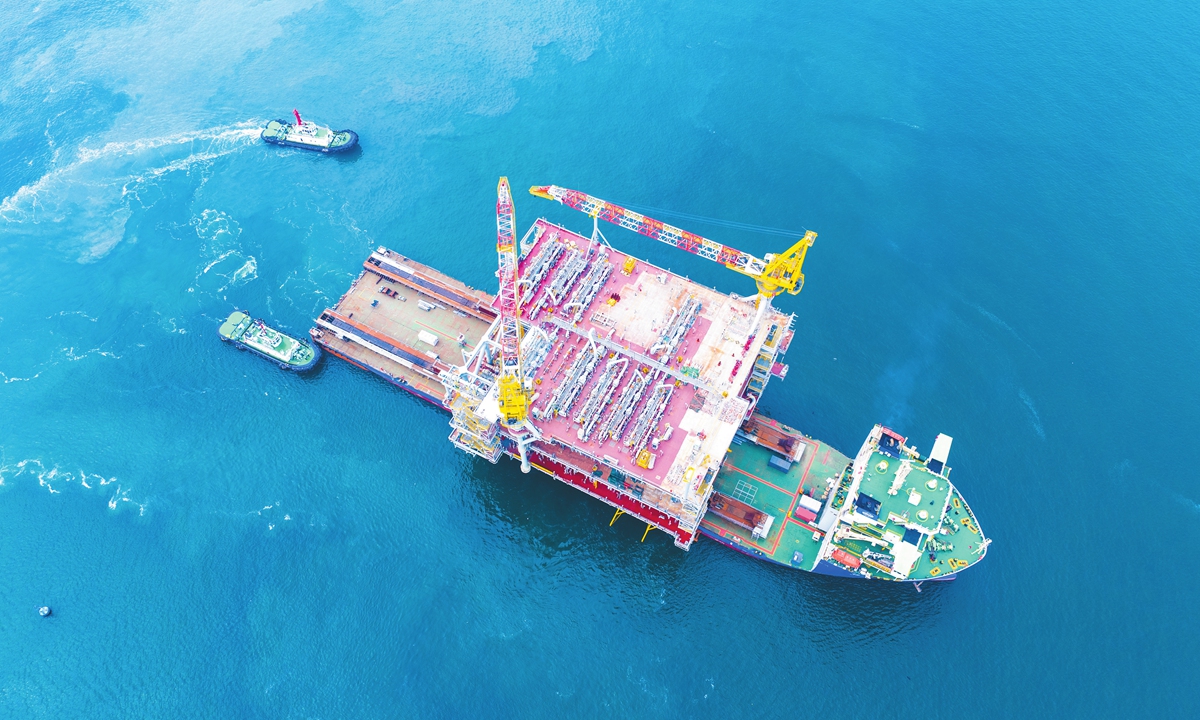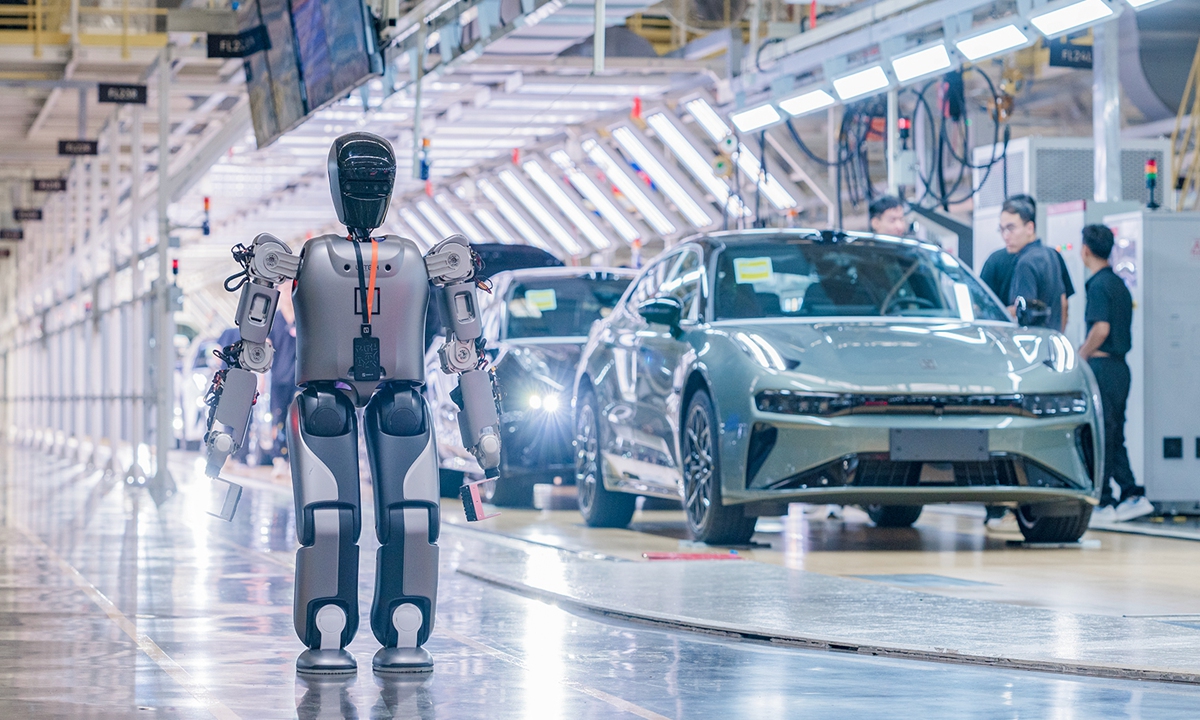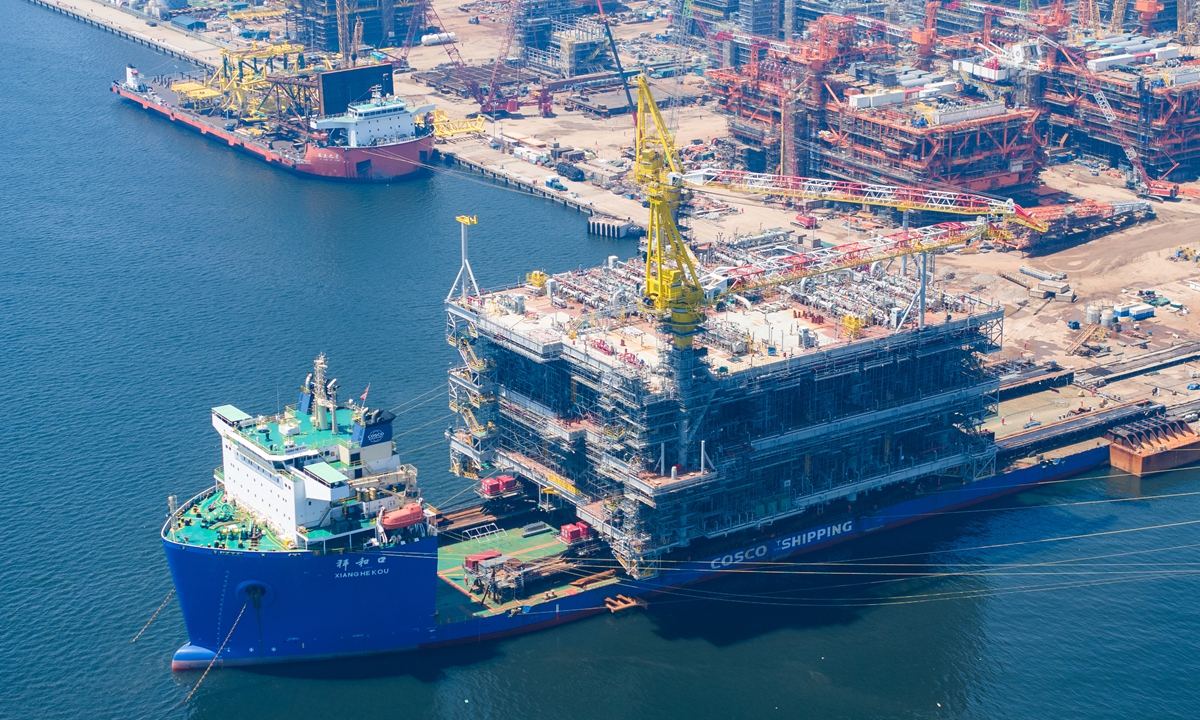Fast-evolving marine engineering to be an important lever of powering China’s economic growth

A vessel carrying China's heaviest offshore oil platform departed from Qingdao, East China's Shandong Province, on August 16, 2024, en route to Saudi Arabian waters. Photo: VCG
Yin Jifu is a senior engineer with the National Engineering Research Center of Dredging Technology and Equipment under the state-owned construction giant China Communications Construction Company (CCCC).
Yin, whole holds a doctorate degree, has been working hard.
"The recently concluded third plenary session of the 20th Central Committee of the Communist Party of China filled me with great confidence. The reform-centric resolution of the plenum led me to believe that now it is the right time to do big things," Yin told the Global Times.
According to a resolution adopted at the plenum, the country vowed to foster new quality productive forces, advance modern engineering technology, and establish mechanisms to ensure increased funding for future industry innovation, while enhancing the institutions and mechanisms for promoting the development of the marine economy.
For Yin, all these matters hold special significance. Spurred by top-down policy incentives and driven by a sense of urgency, he feels that there are many big things to do.
"For instance, to extract valuable metals from under the wild ocean waves could have huge implications for the lifeline of the nation's emerging new industries, and that's where our expertise can be of great use," Yin told the Global Times.
According to his estimation, each electric vehicle consumes 10 times the amount of rare metals as used by an internal combustion engine vehicle, so endeavoring to seek marine technology breakthroughs could power the country's future development.
Yin is not alone. The resolution adopted at latest CPC plenum has sparked renewed vigor in the hearts of those in the nation's marine engineering sector, from scientists in the lab to frontline workers on oil rigs and vessels at sea.
Marine engineering
Behind the story of Yin and many others is China's rapidly developing marine engineering sector - one of the fastest growing industries in the world.
After years of accumulating strengths and heavy investment devoted to solving tech bottlenecks, China's marine engineering sector has enjoyed meteoric development during recent years.
The nation has successfully rolled out its domestically manufactured large cruise vessel, large liquefied natural gas ship, the world's largest-capacity offshore wind turbine and a series of floating facilities used in offshore oil and gas exploration.
Marking one of the latest achievements, on August 12, a production facility in Qingdao, East China's Shandong Province under China National Offshore Oil Corporation completed and handed over the 17,000-ton, 24-story-building-high Marjan oil and gas collection and transportation platform - China's heaviest offshore oil and gas platform destined for overseas markets - to its clients from Saudi Arabia.
In the first six months of the year, China's marine economy expanded steadily, outperforming national GDP growth. The sector's gross output reached 4.9 trillion yuan ($678.55 billion), up 5.6 percent year-on-year, state broadcaster China Central Television reported on July 31, citing data from the Ministry of Natural Resources.
Notably, the growth rate of the marine economy was 0.6 percentage points higher than that of the overall economy from January to June.
Significantly, marine equipment manufacturing has witnessed a marked rebound, the ministry said, with multiple sizable deals clinched in the second quarter.
The new orders of marine engineering projects increased by 205 percent year-on-year, while the value of holding orders rose by 11.6 percent.
In the meantime, the country's shipbuilding capacity, marine traffic and cargo throughput all improved, with the foreign trade value of vessels and offshore wind turbine and parts increasing by 87.3 percent and 32.6 percent year-on-year, respectively, according to the ministry.
Analysts noted that the emerging marine engineering sector is set to make up a larger share of China's economy, as the sector has greater growth potential, featuring the use of new technologies.
Tech-driven growth
The third plenum resolution's emphasis on science-technology and innovation and digital technologies has led to a deep resonation with those in the marine engineering sector, whose job's prerequisite is the solid mastery of scientific knowledge and engineering expertise.
Zeng Nannuo, an oil worker at Shenhai Yihao, or Deep Sea No 1, China's first independently developed ultra-deepwater gas field, told the Global Times that the third plenum has injected renewed confidence across the industry, with the emphasis on fully implementing the strategy of invigorating China through science and education, the strategy of developing a high-quality workforce and the innovation-driven development strategy.
The platform, which has recorded an accumulated natural gas output of over 8 billion cubic meters, with its oil output exceeding 800,000 cubic meters as of May 3 this year, incorporates cutting-edge technologies such as 5G wireless telecommunication, digital twins, and Internet of Things technology.
"We will continue to implement innovation-driven development strategy, intensify the efforts in mastering key technologies and core parts, nurture the new quality productive forces in the marine energy sector, and further intensifying the digitalization of oil & gas production," Zeng said.
The emphasis by the resolution on scientific innovation is very heartening, CCCC's Yin said.
"Deep sea and deep earth probes require the pooling of resources from all sides, and the trend, which is already emerging, is expected to accelerate further," Yin said.
As part of a national push to foster scientific breakthroughs and break technological bottlenecks constraining the development of the fast-growing marine industry, a number of Chinese centrally administered state-owned enterprises are setting up a good number of innovation-driven consortiums to converge their scientific strengths.
CCCC led and set up in July a marine engineering innovation consortium, with initial objectives such as mastering technologies for key equipment for large-scale offshore wind farms.
"Now it is time to do big things," Yin said. "I can't say we are going to do zero-to-one sort of deeds, but at least we are aiming to connect the dots between labs and the vast ocean."



